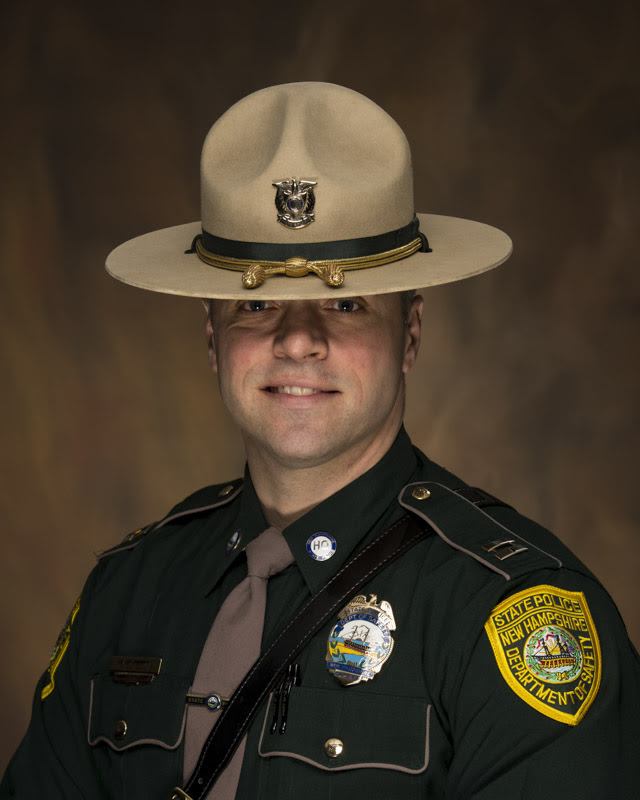By CATHERINE MCLAUGHLIN, InDepthNH.org
CONCORD – Featuring presentations on state and local police training and standards, the Commission on Law Enforcement Accountability, Community, and Transparency met for its second meeting on Friday.
The first two meetings concerned Robin D. Melone, president of the NH Association of Criminal Defense Lawyers, who said the word race was rarely spoken and the police who provided presentations didn’t appear to think race in policing is a problem in New Hampshire.
“Our hope that this Commission had intentions of making real change are quickly fading,” Melone said in an email to InDepthNH.org.
On Friday, commission members Ronelle Tshiela and Eddie Edwards, who were unable to ask questions on Thursday because of time constraints, asked about Police Standards and Training Council Director John Scippa’s presentation that day.
“In terms of developing a viable lesson plan moving forward, I would not rely on anyone inhouse to direct that effort,” Scippa said in response to a question by Tshiela about how cultural sensitivity is and should be performed.
Col. Nathan A. Noyes, Director of the New Hampshire State Police, explained the recruitment process, the rules and standards against which trainees and officers are held internally accountable, and the entry and in-service training programs State Police officers are required to complete in addition to state academy training.
His complete presentation is available here.
“We believe that healthy, well-trained, prepared police officers will provide better services to those in our community,” Noyes said.
Since 2008, New Hampshire State Police has implemented amendments and additions to its training and standards, particularly around peer accountability, mental health awareness, implicit bias training, and officer well-being.
Noyes emphasized the importance of awareness and de-stigmatization of officer mental health in the culture of the agency.
“We are looking for new training all the time,” Noyes said, noting that their focus since before the onset of the pandemic, has been on bolstering implicit bias training among officers and recruits.
Questions from LEACT commission members focused on whether state police agencies should seek accreditation, creating a culture of officer accountability when witnessing misconduct by a fellow officer, and traffic stop protocols.
Tshiela, a representative of Black Lives Matter Manchester, said that reporting race during a traffic stop should be made a mandatory part of record keeping, so as to help measure the efficacy of bias-training and identify problematic trends among officers.
Noyes said he was not prepared commit at this time to that requirement.
Julian Jefferson, a Black public defender, supported making it an express and written duty that officers report misconduct by their peers.
“There is certainly a culture in this organization and across the state, you are responsible and held accountable for your actions,” Noyes said. Jefferson said that accountability should be extended to actions that officers witness as well.
Melone said in an email she was concerned that the word race was rarely spoken during the meetings.
“It was nearly two hours into the first day before Joseph Lascaze, a Black ACLU representative, first said it. On day two, when asked if he would support making race a mandatory demographic to be collected at every police contact, Col. Noyes said he was not prepared to answer,” Melone said. “This refusal to commit to a simple data collection point was just one more exhibition of how tone deaf the law enforcement members are to the very purpose of the Commission. For an agency said to be committed to being better, it would seem an easy, ‘yes’ because having data on race issues would help identify patterns of implicit bias.”
Melone said it appears that law enforcement sees no issues with race in New Hampshire policing. “And they appear to see the Commission only as a tool to convince politicians that the police need more money,” Melone said.
Justice Sawako Gardner of the New Hampshire Circuit Court asked about the strictness of candidate selection and how potential bias is detected.
Noyes emphasized that State Police seek “Candidates that are going to choose this profession as a calling,” and that there is no explicit test for racial bias, the thorough nature of the background check, recommendation investigation, interviews, and polygraph test undergone by candidates often “reveals things people are trying to hide.”
Robert Quinn, Commissioner of the Department of Safety, added that a thorough social media search is performed and expressed that “clearly there are opportunities moving forward to identify bias in candidates” during the selection process.
Noyes stated his openness to committee recommendations that would affect State Police policy and culture for the better, saying that, “Policy is extremely important but culture is more so: that is the difference between discipline and self-discipline.”
Chief Charlie Dennis, Chief of Police in Hanover and current president of the New Hampshire Association of Chiefs of Police, discussed local department’s training processes in addition to the statewide training. “It is left to the individual department to determine what training officers receive, and that can vary widely from department to department,” he said.
Dennis also weighed the benefits and costs, largely financial, to the accreditation process, completed through the Commission for Accreditation for Law Enforcement Agencies (CALEA).
Dennis’ presentation in full can be found here.
Discussion on the Dennis’s presentation will occur at the Commission’s next meeting at 9:30 a.m. on Thursday, July 2.
Thursday’s meeting featured a presentation from John Scippa, the Director of the Police Standards and Training Council, on the manner and content of training undergone by all law enforcement officers in the state, followed by questions from commission members. More on Thursday’s meeting here.
Due to the COVID-19 pandemic, the commission has thus far met via public conference call, though requests for a medium which features video has been requested and the commission is in the process of transitioning to it. Call-in information, as well as directions for sending questions and statements and meeting agendas and transcripts, is posted on the commission’s webpage here.
InDepthNH.org’s Nancy West contributed to this report.





